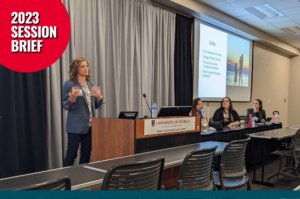By Moriah Thomas
 A farmer struggling with mental health but can’t find the courage to talk about it. Someone recently diagnosed with diabetes who doesn’t know where to start. An expecting mother who is not sure if it is safe to eat cold deli meats. These are just a few of the people that the University of Georgia Extension and the Georgia Clinical and Translational Science Alliance (CTSA) are reaching through their programs.
A farmer struggling with mental health but can’t find the courage to talk about it. Someone recently diagnosed with diabetes who doesn’t know where to start. An expecting mother who is not sure if it is safe to eat cold deli meats. These are just a few of the people that the University of Georgia Extension and the Georgia Clinical and Translational Science Alliance (CTSA) are reaching through their programs.
At the 12th annual State of the Public Health Conference at UGA, a panel of experts presented on three Extension and CTSA programs that bridged the gap between research, health care practice and community support.
Allison Berg, associate professor and nutrition and health specialist at UGA Extension, said that education is the main goal of her organization. Extension agents work in the community to improve people’s knowledge in areas like their food, finances and even relationships.
“So, we often say that Extension is the front door of the university because you can meet us in your community through one of these individuals,” Berg said.
Extension’s presence in all 159 counties in Georgia provides a unique opportunity for researchers to reach and help communities.
Sarah Henes, assistant professor, Extension nutrition specialist and state coordinator of the Expanded Food and Nutrition Education Program (EFNEP) provided an example of how her program worked through Extension to help pregnant women and new mothers.
Maternal health in Georgia is “abysmal,” said Henes. EFNEP provides nutrition guidance for low-income families, with part of their target audience being pregnant women. Through online teaching modules and in-person “peer educators,” specialists can deliver prenatal health information in addition to nutrition education.
Another program the panelists highlighted was the National Diabetes Prevention Program, which is a free program that provides guidance after a diagnosis or jump starting their preventative health. Approximately 500 people have participated through Extension offices in Georgia.
CTSA’s role in this partnership is to translate the research going on at UGA to communities. UGA Extension acts as the middleman between researchers, the CTSA, and communities by keeping the public up to date with and involved in the research.
The partnership is a model for moving research innovations out of the walls of universities and into communities faster where it may be needed most.
